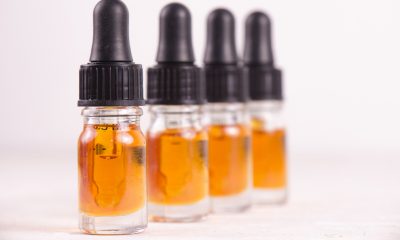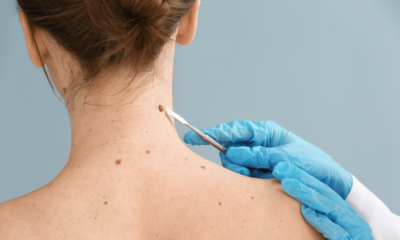New research supports the use of CBD for seizure reduction, nicotine withdrawal and sleep, while scientists shed more light on the impact of prenatal cannabis use.
Researchers across the world are investigating the therapeutic potential of cannabis in managing a wide range of conditions.
In recent months new studies have been published investigating CBD for improving sleep quality, reducing seizures in adults with focal epilepsy and in reducing the symptoms of nicotine withdrawal.
Meanwhile cannabis containing a balanced formulation of CBD and THC was shown to improve quality of life and reduce opioid use in patients with multiple sclerosis (MS), and a new paper explores the impact of prenatal cannabis use on neurodevelopment.
We take a look at some of the latest findings here.
CBD may help reduce symptoms of nicotine withdrawal
Some early research has suggested that cannabidiol (CBD) could be used to help those trying to quit smoking curb their nicotine cravings. A recent open-label crossover study further supported this theory, with researchers testing whether 320mg of CBD taken orally would reduce withdrawal symptoms and anxiety among participants refraining from using e-cigarettes.
“After controlling for participants’ positive CBD expectancies, results were consistent with hypotheses, suggesting CBD reduced both nicotine withdrawal symptom severity and state anxiety during e-cigarette abstinence,” the authors say.
“These preliminary findings suggest testing the impact of CBD on e-cigarette cessation attempts is warranted.”
Read more about the study here
Medicinal cannabis improves symptoms and may reduce opioid use in MS
A retrospective review of over 140 patients with multiple sclerosis (MS) authorised to access medicinal cannabis in the US, found that they experienced ‘extensive symptom improvement’ after starting the treatment. Most patients were taking cannabis containing a balanced formulation of CBD and THC
The most common improvements were pain reduction (72%), spasticity (48%) and sleep (40%). There was also a significant reduction in opioid use among many patients.
The authors concluded: “In many patients with MS, MC [medical cannabis] was well tolerated, eased pain and spasticity, improved sleep and other symptoms, and reduced use of concomitant opioid analgesics. Prospective studies are needed to further investigate the role of MC in the treatment of patients with MS.”
Read more here
CBD reduces seizures in adults with treatment-resistant focal epilepsy
While CBD has been approved as a treatment for certain rare forms of epilepsy in children, there is less research on adults. An open, observational, prospective study was conducted in adult patients with drug-resistant focal epilepsy undergoing outpatient treatment in Argentina.
A total of 44 patients were treated with oral CBD at an average daily dose of 335mg. Following treatment, 5% of patients were seizure-free, 32% of patients reduced more than 80% of their seizures, and 87% of patients reduced 50% of their monthly seizures. Just over a third reported mild adverse events, with no severe adverse events reported.
“At the end of the study, we found in most patients a significant improvement in the quality of life, in all the items evaluated,” the authors say.
“Adjuvant treatment with CBD in adult patients with drug-resistant focal epilepsy was effective, safe, well tolerated, and associated with a significant improvement in their quality of life.”
Read more
Prenatal cannabis use not linked to worse neurodevelopmental outcomes in children
To date there is limited evidence for the effects of cannabis use during pregnancy on the unborn child. Although some studies suggest it may be linked to an increased risk of the baby being born prematurely and/or at a lower birth weight, findings are generally inconsistent.
A recent study explored the effect of prenatal marijuana exposure (PME) on child neurodevelopment. Researchers evaluated participants from the Raine Study, a cohort of 2868 children born between 1989 and 1992. The primary outcome was the Clinical Evaluation of Language Fundamentals (CELF) at age 10, with a number of secondary outcomes also analysed.
The researchers say: “After adjusting for sociodemographic and clinical covariates, PME was not associated with worse neuropsychological test scores at age 10 or autistic traits at 19-20.”
Read the study here
CBD as effective as melatonin for improving sleep
One of the first robust clinical trials into the effects of CBD on sleep has found that a low dose of the cannabinoid is ‘as effective’ as the complementary herbal remedy melatonin at improving sleep quality.
Over 1,700 adults experiencing symptoms of sleep disturbance were randomly allocated one of six products containing either 15 mg of CBD isolate or 5 mg melatonin, alone or in combination with minor cannabinoids. Sleep disturbance was then assessed over a period of five weeks.
According to the findings all of the formulations led to significant improvements in sleep disturbance, with most experiencing a ‘clinically important’ improvement in their sleep quality. However, there was ‘no significant difference’ between those given the CBD or melatonin.
In their conclusion, the authors state: “Our findings suggest that chronic use of a low dose of CBD is safe and could improve sleep quality, though these effects do not exceed that of 5mg melatonin. Moreover, the addition of low doses of CBN and CBC may not improve the effect of formulations containing CBD or melatonin isolate.”
Read the full study here
Want more stories like this delivered direct to your inbox? Sign up to our free weekly newsletter here
Home » Science » Five new cannabis research studies – sleep, epilepsy, MS and more

 News6 months ago
News6 months ago
 Science5 months ago
Science5 months ago
 Industry6 months ago
Industry6 months ago
 News6 months ago
News6 months ago
 News5 months ago
News5 months ago
 Health5 months ago
Health5 months ago
 News5 months ago
News5 months ago
 Health3 months ago
Health3 months ago












